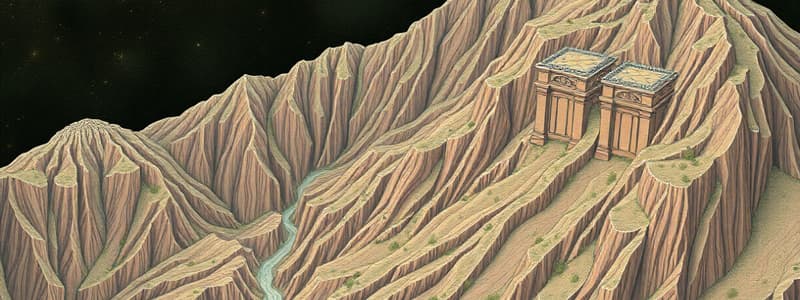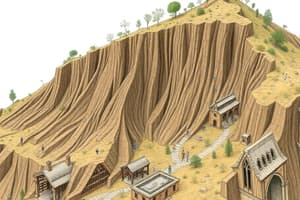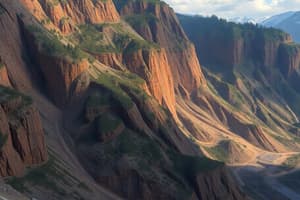Podcast
Questions and Answers
Which of the following best describes mass wasting?
Which of the following best describes mass wasting?
- The horizontal movement of soil due to wind.
- The downslope movement of rock or soil as a coherent mass. (correct)
- The upward movement of water in soil.
- The lateral movement of tectonic plates.
Water saturation can act as a driving force in mass wasting.
Water saturation can act as a driving force in mass wasting.
True (A)
What is the Angle of Repose?
What is the Angle of Repose?
The maximum slope angle at which a given unconsolidated material is stable.
The ____ factor is the ratio of resisting forces to driving forces in mass wasting.
The ____ factor is the ratio of resisting forces to driving forces in mass wasting.
What type of mass wasting involves the rapid slide of rock along planes of weakness?
What type of mass wasting involves the rapid slide of rock along planes of weakness?
Match the type of mass movement with its description:
Match the type of mass movement with its description:
Deep-rooted vegetation can enhance mass wasting.
Deep-rooted vegetation can enhance mass wasting.
What is a potential slip plane in the context of mass wasting?
What is a potential slip plane in the context of mass wasting?
What percentage of particles in a debris flow are coarser than sand?
What percentage of particles in a debris flow are coarser than sand?
Vegetation increases slope stability by completely removing the risk of landslides.
Vegetation increases slope stability by completely removing the risk of landslides.
List one factor that triggers rapid mass wasting.
List one factor that triggers rapid mass wasting.
A __________ is the slow-moving flow of saturated materials during wet weather conditions.
A __________ is the slow-moving flow of saturated materials during wet weather conditions.
Match the mass wasting processes with their characteristics:
Match the mass wasting processes with their characteristics:
Which of the following is NOT a measure to prevent landslides?
Which of the following is NOT a measure to prevent landslides?
What role does water play in slope stability?
What role does water play in slope stability?
Earthquakes are a factor that can trigger rapid mass wasting.
Earthquakes are a factor that can trigger rapid mass wasting.
Flashcards are hidden until you start studying
Study Notes
Mass Wasting
- Downslope movement of rock or soil
- All inclusive term for any downslope movement of earth materials
Forces on Slopes
- Driving forces: move earth materials downslope
- Downslope component of weight of material, including vegetation, fill material, or buildings
- Resisting forces: oppose movement
- Strength of material
Potential Slip Planes
- Surfaces of weakness in the slope material including bedding, foliation, and fractures
Angle of Repose
- Maximum slope angle at which unconsolidated material is stable
Safety Factor
- Ratio of resisting forces to driving forces (RF/DF)
- SF > 1: Slope is stable
- SF < 1: Slope is unstable
Triggers for Mass Wasting
- Gravity: Driving force of all mass wasting
- Undercutting: Stream eroding valley wall
- Wave Action: Waves eroding base of cliffs
Role of Vegetation
- Stabilizes ground through deep roots
- Protects soil from erosional effects of rain
- Mass wasting enhanced where plants are lacking: steep slopes, forest fires, human removal of plants.
Types of Mass Wasting
- Fall: Freefalling of detached pieces of any size
- Rockslide: Rapid slide of rock downslope along planes of weakness
- Slump: Downward slipping of rock or unconsolidated material along a curved surface
- Creep: Slow downhill movement of soil and regolith
- Rock Avalanche: Very rapid downslope movement of rock and debris, can reach speeds of over 200 kilometers per hour
- Debris Flow: Downslope flow of relatively coarse material, more than 50% of particles are coarser than sand
Debris Flow
- Movement may be very slow or very fast
- Mudflows, debris avalanches, and debris flows
- Small to moderate magnitude events
- Occasional large magnitude events
Earthflow
- Viscous (thick) debris flow
- Slow-moving
- Faster in wetter weather
Creep
- Very slow movement
- Result of freezing and thawing
Triggers for Rapid Mass Wasting
- Rain: Triggers landslides and mass wasting
- Oversteepening: Cutting at the foot of the slope or adding material at the head of the slope
- Deforesting/Devegetating: Removal of vegetation
- Earthquakes: Trigger landslides and mass wasting
Preventative Measures
- Slope Reduction: Reduce slope angle, add supporting material, reduce the load
- Retention Structure: Use ground covers or vegetation to prevent mass wasting
- Fluid Removal: Decrease water content or pore pressure by improving drainage on slope surface
Studying That Suits You
Use AI to generate personalized quizzes and flashcards to suit your learning preferences.




